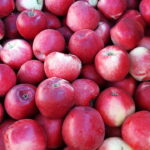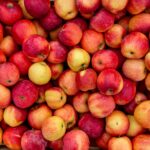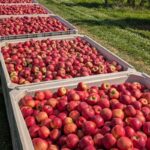O'Rourke: changes ahead for apple and pear markets

Twenty-five years ago, World Apple Report executive director Desmond O'Rourke visited Chile for the first time. He described the growing industry he saw then, "as still one of the most impressive fruit industries in the world."
The global stage has changed, however. The road ahead for Chile and other fruit producing countries will be marked by changes in production, new varieties, population growth, emerging new markets and new retail trends.
During the International Pome Fruit Seminar in Chile, O'Rourke shared worldwide industry trends and possibilities to continue forward successfully.
In general, fruit production over recent years has been growing. Lack of growth in per capita income has created pressure on pricing, however,
The fastest growth has been observed in apples, pears, kiwifruit and sweet cherries. According to O'Rourke's statistics, production of such fruits is expected to continue through 2020.
The big question for the industry will be where to find markets for the growing volume of these fruits. Political and economic changes are expected to make answering this task even more difficult.
Fortunately, the population will continue growing and complement rising production.
On the other hand, the historical economic balance will shift. As old leaders like the United States, Japan and Europe transform, markets are emerging in Brazil, Russia, India, China and South Africa (BRICS).
While the effect on global fruit demand is still unclear, it is possible to observe how nations have reacted distinctly to recession. In addition to new commercial barriers, the exchange rate has become more volatile.
O'Rourke described recovery in U.S. fruit demand as strange, given its marked impact on high income brackets.
In contrast, he said, "Europe as a market for producers is weaker that it used to be."
Among BRICS nations, Russia and India have become major apple importers. In Brazil's case, pears have made their mark.
O'Rourke pointed out that these markets also come with their problems, including high tariffs in India, arbitrary barriers in China and protectionist tendencies in Brazil.
He said to take a close look at the reality of promising markets in Asia.
"Asian nations are diverse and demand for products will be as well," he said.
O'Rourke explained that with rapid growth in many parts of the region, the question will be where to place focus.
China and India may receive the most attention, but O'Rourke warned they may also come with fierce competition. Markets in Malaysia and Sri Lanka could offer faster growth.
He added that less populated countries like Pakistan and Bangladesh must also be kept in mind.
Alongside demographic changes, global retail is expected to see developments of its own. Mega stores like Walmart will see new formats and competition from specialty stores.
Online retail will also expand and shake up how fruit suppliers arrive to consumers.














































